| 1 |
MyWood-ID soft launch in conjunction with FRIM Inc launching
Date: 2 Feb 2018
Venue: Forest Research Institute Malaysia, Kepong.
After more than two years of joint collaboration between FRIM's wood anatomy lab and UTAR Centre for Computing and Intelligence Systems (CCIS), MyWood-ID, the mobile wood identification system that identifies Malaysian timbers is finally soft-launched on 2 Feb 2018 at Forest Research Institute Malaysia, Kepong.
The soft launch of MyWood-ID was held in conjunction with the launching of FRIM Inc., the commercialization arm of Forest Research Institute Malaysia, by the Deputy Prime Minister, Datuk Seri Dr Ahmad Zahid Hamidi.
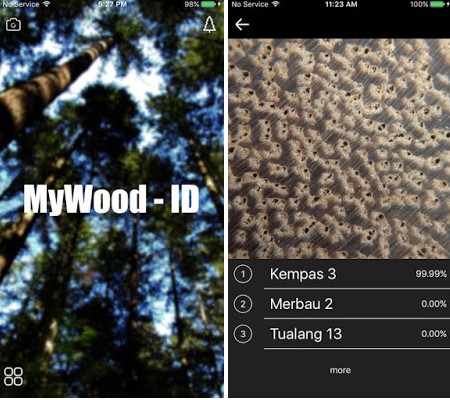
With just an iPhone with Internet connection and an off-the-shelf Olloclip macro-lens to capture the 21x magnified cross-section of a piece of wood, MyWood-ID will be able to imitate the capability of a human wood anatomist, to identify which type of timber the piece of wood belongs to, thanks to the latest artificial intelligence technology.
This technology is very cost-effective and is expected to be useful for timber industires, timber, graders, timber inspectors, quality control inspectors, forest department, log chcecking stations and enforcement officers.
The free trial version of MyWood-ID can identify 20 types of Malaysian wood, including:
- Balau
- Bintangor
- Chengal
- Dark Red Meranti (DRM)
- Light Red Meranti (LRM)
- Jelutong
- Karas
- Kempas
- Keranji
- Keruing
- Merbau
- Mengkulang
- Nyatoh
- Ramin
- Red Balau
- Rubberwood
- Teak
- Tualang
- White Meranti
- Yellow Meranti
The full version of MyWood-ID, which is able to identify 100 types of common Malaysian timbers will be released in a few months time. In the meantime, those interested to learn more may visit these sites:
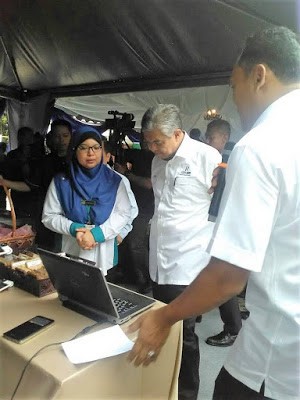
Dr. Nordahlia explained and demonstrated MyWood-ID to the Deputy Prime Minister, Datuk Seri Dr Ahmad Zahid Hamidi

From left: Mr. Tang Xin Jie, Dr Nordahlia, Mr Lim Seng Choon, Dr. Tay Yong Haur
Past and present CCIS members who have contributed to this project are as follows:
• Dr. Tay Yong Haur
• Mr. Tang Xin Jie
• Mr. Cheang Teik Koon
• Mr. Cheang Eu Koon
• Ms. Chong Yong Shean
• Mr. Siew Kar Fai
• Mr. Liew Jia Hau
• Mr. Lee Jing Yong
• Mr. Ching Yaw Hao
• Mr. Wong Jhy Haur
• Dr. Victor Tan Hock Kim
• Dr. Madhavan Nair
• Dr. Sugumaran Nallusamy
• Prof. Dr. Junichi Kishigami
• Mr. Lau Kean Hong
• Mr. Ng Choon Boon
• Mr. Ooi Ean Huat
• Mr. Wong Chim Chwee
|
| 2 |
CCIS Talk: Data Science in Practice by Fabian Chan, SEEK Asia.
Speaker: Fabian Chan, Research Manager of SEEK Asia
Date: 28 Feb 2018 (Wednesday)
Time: 5:00 pm - 6:00 pm
Venue: KB301, KB Block, UTAR Sungai Long Campus.
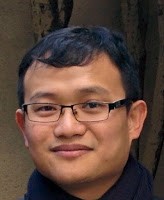
Fabian started his career as an software engineer, and later a lecturer, before joining SEEK Asia. In SEEK Asia, Fabian leads a team of data scientists that focuses on figuring out how best to leverage data, AI and machine learning techniques to help people get better jobs. The team focuses on aspects of search, recommendations, personalisation and other aspects of seeking a better match between a candidate and employer.
|
| 3 |
CCIS Talk: The Future Outlook and the Path to be a Data Scientist
Speaker: Dr Poo Kuan Hoong, Principle Data Scientist, Coqnitics & Senior Data Scientist, of ASEAN Data Analytics Exchange (ADAX).
Date: 14 Mar 2018 (Wednesday)
Time: 5:00 pm - 6:00 pm
Venue: KB301, KB Block, UTAR Sungai Long Campus.
Malaysia is one of the few countries with a structured Big Data Analytics (BDA) roadmap to untap the value of big data. At the turning point of digital revolution, the powers of big data can be used to describe a problem, assess a situation, forecast results, and prepare solutions that can be applied to across all sectors in Malaysia. The demand for data scientists in Malaysia is expected to increase by 33% to 2,000 in 2020 from 1,500 experts in 2014 as more companies turn to Big Data Analytics (BDA) to build their competitive edge.
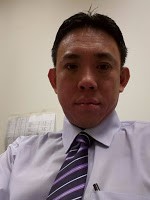
Backed with 15 years of academic and research background, Dr Poo is a passionate practitioner in the area of Data Science, Machine Learning and Artificial Intelligence. A graduate of Nagoya Institute of Technology (Japan), Dr. Poo holds a Doctorate degree (Ph.D.) in Computer Science, a Master of Information Technology (UKM), and a Bachelor of Science (UKM). Dr. Poo applies his combination of research and industrial experience in big data analytics, data mining, Machine Learning and Artificial Intelligence to provide consultancy on data strategy for companies in various sectors including finance. Telecommunication and technology startups.
|
| 4 |
CCIS Talk: Entrepreneurship in the age of automation
and artificial intelligence
Speaker: Cheemun Foong, Chief Technology Office at MoneyLion, Inc.
Date: 12 Mar 2018 (Monday)
Time: 3:00 pm - 4:00 pm
Venue: KB210, KB Block, UTAR Sungai Long Campus.
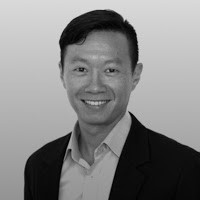
Chee Mun Foong is the Chief Technology Office at MoneyLion, Inc. Prior to that, he was a founding member of Simulex Inc, a boutique research firm specializing in artificial intelligence and advanced analytics for predicting human behavior. During his 12 years at Simulex, he consulted for various branches of the US Department of Defense and Fortune 500 companies. His work ranged from big-data distributed computation to social-sciences encoding into mathematical and algorithmic models.
Chee subsequently co-founded MoneyLion Inc. with the goal being to bring the most advanced artificial intelligence technology into retail finance. At MoneyLion, he oversees a multi-geographical engineering and analytics team to create an industry-leading platform that encompasses underwriting, marketing, user-experience, and user-acquisition.
Chee graduated from Purdue University with a degree from electrical engineering.
|
| 5 |
CCIS Talk: Experience Continental: Driving with everything
well within reach and view
Speaker: Bogdan Simonia, Director & Head of Research & Development Continental Automotive Components Malaysia Sdn Bhd
Date: 29 March 2018 (Thursday)
Time: 5:00 pm - 7:00 pm
Venue: KAG01, KA Block, UTAR Sungai Long Campus.
Our vision “Always On” sees the vehicle of the future as a partner that supports its users with intelligent solutions. For us, tomorrow’s vehicle is seamlessly connected, user-friendly, comfortable and intelligent. The holistic human-machine interface also plays a key role. It structures and visualizes information quickly and clearly, while taking into account the driving situation and the driver’s condition. Users are continuously receiving reliable feedback on all their actions. This strengthens their trust in individual vehicle functions and is an important aspect on the road toward automated driving.
In our Instrumentation & Driver HMI business unit we work on the best ways of processing, prioritizing and presenting information. With holistic solutions to the human-machine interface, Continental ensures that drivers intuitively receive the exact information they need to know whilst driving. In order to avoid driver distraction the prioritization of information on different displays, depending on vehicle and driving situation, is one of the key focuses of Continental. Beyond that innovative user interfaces for intuitive control of different functions are developed; this includes components as well as fully integrated systems and complete cockpit modules for all vehicle types and use cases
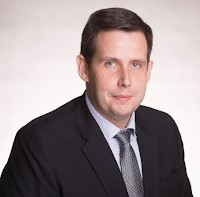
Mr Bogdan Simonia is the Director & Head of Research & Development (R&D) of Continental Automotive Components Malaysia Sdn Bhd. He joined the company in March 2015 and is based in the city of Prai, Penang state, Malaysia, where he spearheads the R&D Department. With his impressive track record, he was quickly promoted to R&D Director position since beginning of 2017.
At the young age of 7, Mr Simonia had already shown an exceptional interest in computers. His interest has only escalated from thereon and this lead him to further advance his studies in computer programming in high school. Later on, he enrolled in the Polytechnic University of Timisoara, where he graduated, in 2006, with a Bachelor Degree in “Systems and Computer Science”.
In his three years’ at Continental Malaysia, Mr Simonia has successfully achieved several important milestones, e.g. doubling of the engineering center size, introduction of 2 new products as well as gaining the trust of internal and external stake holders in future growth opportunities for the Malaysian location. Further, he has focused on building up the capability to develop full products for the automotive market out of Penang, by developing, in parallel to the R&D competences, the project management team.
Mr Simonia began his automotive career with Continental Automotive in Romania, at Timisoara, in 2004, where he started as a Software Engineer for instrument clusters for commercial vehicles, specifically, truck applications. In 2008, he became the Team Leader for a telematics and tolling R&D team, which was for the first time being setup in Romania.
Two years later, the scope of the team was expanded to a hardware and software platform team, serving a wide range of applications, from the traditional analog-digital instrument cluster to telematics, tolling and full digital cluster products. During this, he became a Certified SCRUM master as well, deploying AGILE practices in the organization. When he left Timisoara, in 2015, the platform team was running successfully with multiple projects in several markets.
Outside the office, Mr Simonia is a husband and a father of two boys, one of which was born in Malaysia. He relaxes by spending time with his family, occasionally plays tennis or taking a fishing trip.
|
| 6 |
CCIS Talk: This is the Pursuit by
Speakers: Tay Lang and Hui Qing from SearchGuru
Date: 6 July 2018 (Friday)
Time: 4:30 PM – 6:00 PM
Venue: KB316, KB Block, UTAR Sungai Long Campus.
In the real world, IT specialists do not work alone. Depending on the industry, they must communicate with people from a myriad of backgrounds. The challenge is to convey ideas effectively without using complex technical terms and jargon. An even bigger challenge, is to listen and understand the client’s needs and propose solution(s) that’s practical and cost-effective.
In this talk, Tay Lang & Hui Qing will offer practical skills on how fresh IT graduates can progress in the workplace while enjoying it at the same time. They will also offer practical insights and advice to give young graduates a more holistic view of the world.
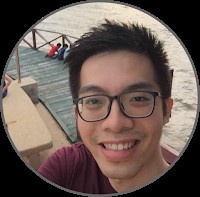
A computer science graduate from UTAR, Tay Lang currently leads the development team in SearchGuru, one of the SEA’s largest full-service performance marketing agencies, that is made up of 14 awesome colleagues. Specializing in business development and project management, Tay Lang provides digital solutions to his clients bringing their company to the next level.

Graduated from UTAR major in Computer Science, Hui Qing begun working life at a hosting provider company for 3 years, then became a freelancer for a year before finally joined SearchGuru. Currently as a development team lead, Hui Qing manages the development team and also resources for all sorts of projects. Additionally, Hui Qing shares his experiences and bring positive growth in terms of skills level in the team.
|
| 7 |
CCIS Talk: A brief peek into a software engineer's career
in a multi-national company
Speaker: Tay Kae Yi, Senior Software Engineer, Exact Asia Development Center.
Date: 13 July 2018 (Friday)
Time: 4:30 PM – 6:00 PM
Venue: KB206, KB Block, UTAR Sungai Long Campus.
Software development is no longer a straight forward job which requires only simple knowledge on HTML or other object-oriented programming languages.
The world of software development has grown so complicated and diverse, that companies are now looking for specialized developers. Front-end, back-end or full-stack developer? Which one should you go for? This talk will be a sharing session on the experience of working in a multi-national software company, the roles and responsibilities of different types of developers and also on the different perspectives in a software development life cycle.

Tay Kae Yi has joined Exact Asia Development Center (ADC) since late 2010, starting off as a Software Engineer in a project team specialized in Professional Services Automation.
From here on, he has explored different perspectives and roles of the software development life cycle, such as functional designer, product owner, software engineer, quality engineer, and technical lead.
Currently, he holds the Senior Software Engineer role and is working in the Black Ops team.
He now focuses on leading research & development on latest technologies and supporting other development teams in ADC.
|
| 8 |
CCIS Talk: Effective Web Application Development and Testing using a Model-Driven Approach
Speaker: Emeritus Professor Paul Strooper of the University of Queensland, Australia.
Date: 9 Oct 2018 (Tuesday)
Time: 11:00 AM – 12:00 PM
Venue: KB323, Level 3, KB Block, UTAR Sungai Long Campus.
To be adopted by architects, modelling approaches must provide a means to leverage the software patterns and architectural styles that are relevant to development practice, instead of those proscribed by black-box CASE tools. Architecture-Centric Model-Driven Software Development (AC-MDSD) is a modelling approach that provides architectural control of the generated application. However, AC-MDSD primarily focuses on generating infrastructure code.
We apply AC-MDSD to web engineering and contribute a technique to define and generate system behaviour that goes beyond the create/read/update/delete infrastructure functionality. We use UML profiles augmented with OCL to specify the behaviour. The model is derived by abstracting from the patterns and architecture of the web application in a bottom-up approach. The model is then used to generate artefacts used for both development and testing. The hypothesis is that a model can be used to improve development efficiency, software quality, and reusability for both the development and testing of web applications. It can deliver development efficiency by alleviating repetitive boilerplate development tasks; it can improve software quality by facilitating test tool development and supporting increased test coverage; and it can provide reusability by encapsulating core business ideas to be used across multiple projects and teams.

Emeritus Professor Paul Strooper
Paul Strooper is an Emeritus Professor in the School of ITEE at The University of Queensland. He was an academic at UQ from 1993-2016 and served as Head of School from 2010-2016. He received the BMath and MMath degrees in Computer Science from the University of Waterloo, and the PhD degree in Computer Science in 1990 from the University of Victoria.
His main research interest is Software Engineering, especially software verification and testing, and model-based approaches to software development and verification. He has had substantial interaction with industry through collaborative research projects, training and consultation. He was chair and member of the Steering Committee for the Asia-Pacific Software Engineering Conference, and chair and member of the Steering Committee for the Australian Software Engineering Conference. He is a member of the editorial board of the Journal of Software Testing, Verification and Reliability and was a member of the editorial board of IEEE Transaction of Software Engineering from 2008-2013. From 2015-2017, he was a member of the ARC College of Experts in Engineering, Mathematics, and Informatics. He has been a panel member and chair of numerous accreditation panels for the Australian Computer Society and Engineers Australia.
|
| 9 |
CCIS Talk: Algorithmic Crowdsourcing: Current Status and Future Perspective
Speakers: Jie Wu and Prof. Laura H. Carnell
Date: 14 Dec 2018 (Friday)
Time: 2:00 PM – 3:00 PM
Venue: KB112, KB Block, UTAR Sungai Long Campus
This talk gives a survey of crowdsourcing applications, with a focus on algorithmic solutions. The search for missing Microsoft scientist is used first as a motivational example. Fundamental issues in crowdsourcing, in particular, incentive mechanisms for paid crowdsourcing, and algorithms and theory for crowdsourced problem-solving, are then reviewed. Several applications of algorithmic crowdsourcing applications are discussed in detail, with a focus on big data. The talk also discusses several on-going projects on crowdsourcing at Temple University.

Jie Wu is the Director of the Center for Networked Computing and Laura H. Carnell professor at Temple University. He also serves as the Director of International Affairs at College of Science and Technology. He served as Chair of Department of Computer and Information Sciences from the summer of 2009 to the summer of 2016 and Associate Vice Provost for International Affairs from the fall of 2015 to the summer of 2017. Prior to joining Temple University, he was a program director at the National Science Foundation and was a distinguished professor at Florida Atlantic University.
His current research interests include mobile computing and wireless networks, routing protocols, cloud and green computing, network trust and security, and social network applications. Dr. Wu regularly publishes in scholarly journals, conference proceedings, and books. He serves on several editorial boards, including IEEE Transactions on Mobile Computing, IEEE Transactions on Service Computing, the Journal of Parallel and Distributed Computing, and the Journal of Computer Science and Technology. Dr. Wu was general co-chair for IEEE MASS 2006, IEEE IPDPS 2008, IEEE ICDCS 2013, ACM MobiHoc 2014, ICPP 2016, and IEEE CNS 2016, as well as program co-chair for IEEE INFOCOM 2011 and CCF CNCC 2013. He was an IEEE Computer Society Distinguished Visitor, ACM Distinguished Speaker, and chair for the IEEE.
|













